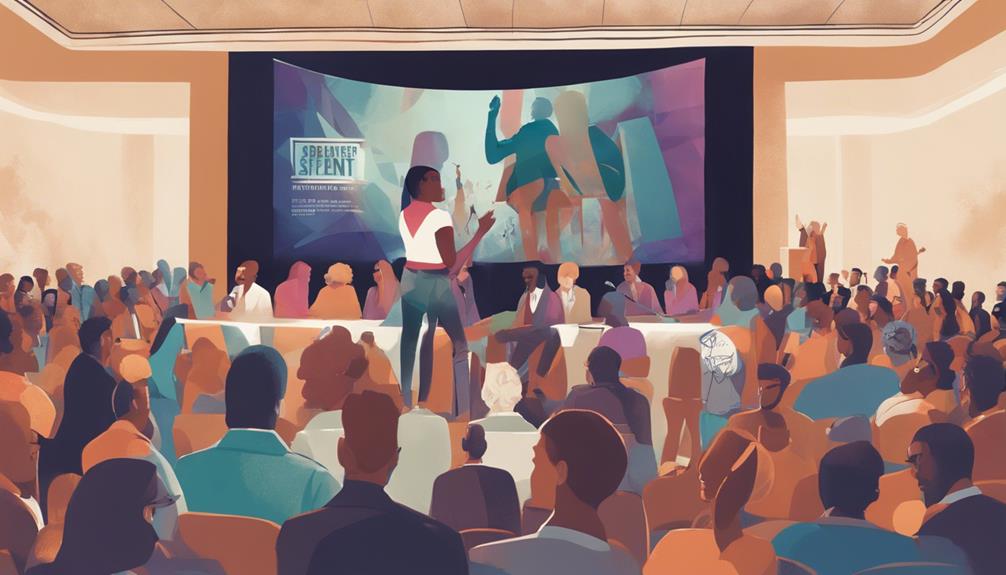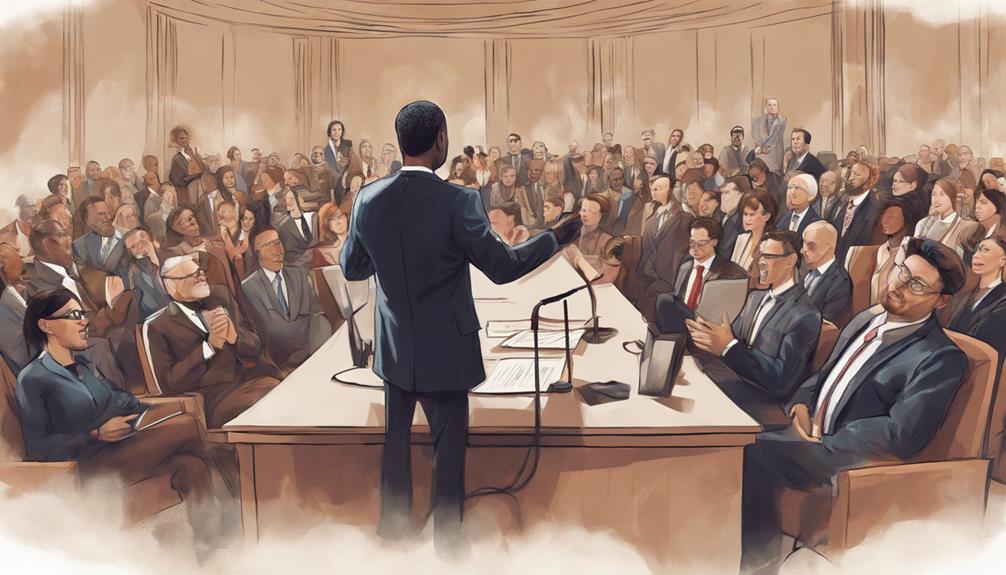To profit from public speaking, position yourself strategically, negotiate fair compensation, and target events with flexible budgets. Focus on consistent content creation, repurpose it for different platforms, and enhance credibility with a quality book. Create a captivating video reel, develop polished online marketing materials, and invest in high-quality videography. Build connections, negotiate payment terms, and offer alternative compensations. Corporate events offer lucrative opportunities and value delivery boosts earnings. Show expertise, emphasize audience impact, and research client budgets to negotiate effectively. Seeking to become a sought-after speaker? Showcase your skills, share valuable content, and invest in an impressive online presence.
Key Takeaways
- Position yourself strategically in the market for lucrative opportunities.
- Negotiate fair compensation by showcasing expertise and audience impact.
- Focus on events with flexible budgets to maximize earnings.
- Differentiate opportunities aligning with financial goals for success.
- Secure paid engagements by negotiating payment terms with clients.
Transitioning to Paid Speaking
Moving to paid speaking involves strategically positioning yourself in the market to attract lucrative opportunities and negotiate fair compensation for your expertise. Evolving from unpaid to paid speaking can be a challenging but rewarding process.
By standing firm with your pricing and focusing on events with speaker budget flexibility, you can establish your value and professionalism in the industry. It's crucial to differentiate between opportunities that align with your financial goals and those that don't compensate speakers.
Consider negotiating payment with clients who initially claim to have no budget. This approach can lead to securing paid speaking engagements, showcasing your expertise while ensuring fair compensation for your services.
Highly demanded speakers are often signed to speakers bureaus, providing access to a wide range of paid opportunities. Remember, persistence and strategic decision-making are key to successfully building a profitable speaking business as you shift from unpaid to paid speaking engagements.
Content Development Strategies

To establish yourself as a thought leader in your industry, consistent content creation through videos, articles, and podcasts is essential. Developing a solid content strategy that resonates with your target audience is vital for success in the speaking business.
Repurposing content for various platforms such as social media, newsletters, blogs, and publications can help maximize visibility and engagement, showcasing your expertise effectively.
Writing and promoting a high-quality book is another valuable content development strategy. Not only does it enhance your credibility, but it also attracts paid speaking opportunities.
Quality content not only helps you stand out in a competitive market for speaking engagements but also positions you as an authority in your field.
Effective Marketing Tactics

To effectively market your speaking services, focus on creating a compelling video speaking reel and polished online marketing collateral. These materials are vital for showcasing your expertise and attracting high-paying speaking opportunities.
Video Speaking Reel
Crafting a compelling video speaking reel is essential for effectively marketing your speaking skills and attracting paid speaking opportunities. Your video reel should showcase your best speeches, audience reactions, and testimonials to make a lasting impression on potential clients.
To make your speaking reel stand out, keep it concise, engaging, and reflective of your authentic speaking style. Here are some tips to enhance your video speaking reel:
- Include highlights of your best speeches and engaging content.
- Showcase audience reactions and testimonials to build credibility.
- Keep the reel concise and reflective of your unique speaking style.
- Optimize the video for online platforms and social media to reach a broader audience.
- Invest in high-quality videography and editing to make your reel visually appealing and impactful.
Online Marketing Collateral
Professional video and marketing collateral play an important role in enhancing your online presence and attracting paid speaking opportunities.
When it comes to online marketing collateral, having a standout speaking reel is essential. Your speaking reel should be a highlight reel of your best moments on stage, demonstrating your expertise and engaging speaking style.
Additionally, your marketing materials should include a well-designed deck outlining your key talking points and a selection of testimonials from past speaking engagements to showcase your impact on audiences.
Strategic Speaking Approaches

Consider strategically identifying speaking events with flexible budgets to negotiate compensation. Starting out by speaking for free can open doors to future paid speaking opportunities.
Shifting from unpaid to paid speaking necessitates a change in mindset and business strategy. Cherry-picking unpaid events that offer significant exposure and networking opportunities can be a valuable part of your strategic approach.
To succeed in the world of paid public speaking, embracing these approaches is crucial:
- Negotiate Compensation: Don't hesitate to discuss payment terms with events that have flexible budgets.
- Prioritize Value: Concentrate on delivering high value to your audience and clients to enhance your chances of securing paid speaking opportunities.
- Network Strategically: Establish connections with event organizers and industry professionals to access more lucrative speaking engagements.
- Diversify Income Streams: Explore various revenue sources beyond speaking fees, such as book sales or coaching services.
- Track Performance: Evaluate the success of your speaking engagements to refine your strategic approach and maximize future opportunities.
Maximizing Revenue Opportunities

To maximize revenue opportunities as a paid public speaker, you must strategize ways to optimize your earnings, diversify income streams, and foster professional growth through increased earnings.
By implementing revenue optimization strategies and exploring alternative compensation methods like sponsorships or product placements, you can enhance your overall income potential.
Focusing on delivering exceptional value to your audience is key to becoming a sought-after speaker and increasing your revenue opportunities.
Revenue Optimization Strategies
Maximize your revenue opportunities by strategically diversifying your compensation options when transitioning into paid public speaking engagements. When targeting audiences, consider these revenue optimization strategies:
- Offer Alternative Compensations: Propose product sales or consulting services in addition to speaking fees to maximize earnings.
- Leverage Corporate Events: Corporate events often have more flexible budgets, presenting a significant revenue potential for speakers.
- Deliver Exceptional Value: Focus on providing value beyond the speech to become a sought-after speaker, increasing your revenue opportunities.
- Emphasize Tangible Benefits: Clients value the impact you bring to their event, so secure that your speech offers tangible benefits to maximize revenue.
- Create Value Propositions: Develop clear value propositions that showcase the benefits of having you as a speaker to attract more lucrative opportunities.
Diversifying Income Streams
Diversifying income streams as a paid public speaker involves exploring various avenues such as workshops, consulting services, online courses, and coaching programs to maximize your revenue opportunities. By offering a range of services, you can cater to different audience segments and increase your overall earnings.
In addition, leveraging merchandise sales, sponsorships, and affiliate marketing can further boost your income as a speaker.
To attract high-paying clients, consider developing premium services like VIP experiences, mastermind groups, and exclusive content. These exclusive offerings can set you apart in the market and generate additional revenue streams.
Moreover, forming strategic partnerships with brands, event organizers, and other speakers can open up new income opportunities for you in front of an audience.
Professional Growth Through Earnings
Exploring different avenues to expand your income as a paid public speaker can lead to significant professional growth through increased earnings.
Transitioning from pro bono workshops to paid keynote speaking can dramatically boost your earning potential.
Proposing alternative compensation methods, like book sales or workshop packages, is key to maximizing revenue opportunities.
Corporate events often come with more flexible budgets for speakers, resulting in higher earnings.
Remember, providing exceptional value to your audiences is crucial for becoming a sought-after speaker and commanding higher fees. Clients are willing to pay for the value you bring, not just for your speech itself.
This shift in mindset compared to years ago showcases how focusing on delivering value can lead to professional growth through increased earnings.
Negotiating Payment for Engagements

When negotiating payment for speaking engagements, prioritize showcasing your value and expertise to justify your desired compensation. By highlighting the unique insights and knowledge you bring to the table, you can negotiate payment effectively. It's crucial to stand firm with your pricing while also being flexible enough to navigate different types of speaking events. Here is a table to help you understand how to approach negotiating payment for speaking engagements:
| Negotiation Tip | Description | Benefit |
|---|---|---|
| Highlight Your Expertise | Present your qualifications and experience to support your desired payment. | Clients recognize the value in investing in a knowledgeable speaker. |
| Emphasize Audience Impact | Describe how your speech will connect with the audience and add value to the event. | Clients are more inclined to allocate a budget for your services. |
| Research Client Budget Flexibility | Grasp the client's budget limitations and be open to negotiating within reason. | Enhances the chances of securing a paid speaking engagement. |
| Provide Case Studies or Testimonials of Past Events | Share success stories from previous speaking engagements to showcase your effectiveness. | Clients gain trust in your ability to deliver results. |
Becoming a High-Demand Speaker

To become a high-demand speaker, focus on establishing yourself as a thought leader in your industry by consistently delivering valuable content and maintaining a strong online presence. Being recognized as an expert in your field will attract audience members seeking your insights and expertise.
Here are some key strategies to help you become a sought-after speaker:
- Showcase Expertise: Demonstrate your credibility and knowledge through quality content and presentations.
- Consistent Content: Regularly share valuable insights through various mediums to keep your audience engaged.
- Polished Online Presence: Invest in professional marketing materials and a compelling speaking reel to attract high-paying opportunities.
- Provide Value: Focus on delivering impactful presentations that leave a lasting impression on your audience members.
- Skill Refinement: Continually refine your speaking skills and adapt to meet the evolving needs and expectations of your audience.
Frequently Asked Questions
Can You Get Paid for Public Speaking?
Yes, you can get paid for public speaking! Build your reputation, connect with speakers bureaus, and negotiate confidently. Stand firm on pricing and target events with budget flexibility. Even if they claim no budget, you can secure paid opportunities.
What Is the #1 Rule of Public Speaking?
Know your audience and tailor your message to resonate with them. Understanding their demographics, interests, and needs is essential. Customize your speech to address their concerns and preferences, enhancing engagement and establishing rapport.
What Is a Reasonable Speaker Fee?
When determining a reasonable speaker fee, consider factors like experience, industry demand, and event type. Established speakers may command $5,000 to $20,000 or more for keynotes, while beginners might start at $500 to $2,500 per event.
How to Monetize Public Speaking?
To monetize public speaking, establish expertise online, create quality content, and market yourself effectively. Build a strong speaking reel and seek recommendations. Negotiate alternative compensation if needed. Corporate events often offer better pay opportunities than industry events.
What Are the Financial Benefits of Paid Public Speaking Compared to Other Forms of Public Speaking?
Paid public speaking offers significant financial benefits compared to other forms of public speaking. The real earnings of public speakers can be much higher when they are paid for their appearances. This can include speaker fees, sponsorships, book sales, and other opportunities that can result in substantial income for experienced and successful speakers.
What Factors Determine the Fees for Paid Public Speaking?
When it comes to determining the highest speaking fees 2023 for public speaking engagements, several factors come into play. These include the speaker’s level of expertise and influence, the event’s audience size and location, the speaker’s demand, and the amount of preparation and customization required for the presentation.
Conclusion
Now that you've learned the ins and outs of paid public speaking, remember: 'Opportunities don't happen, you create them.' Keep honing your skills, developing your content, and marketing yourself effectively to become a sought-after speaker.
With dedication and perseverance, you can turn your passion for speaking into a profitable career. Keep pushing forward and making your mark on the speaking circuit.
The world is waiting to hear your voice.










